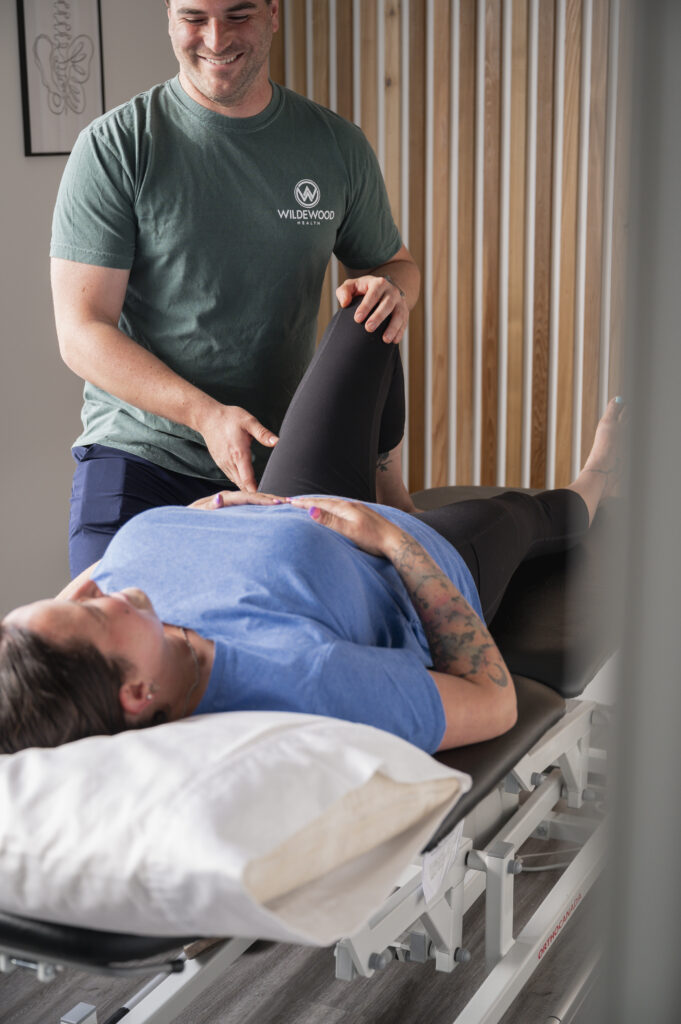Knee pain is one of the most common musculoskeletal complaints, affecting millions of Canadians. The cause of your knee pain could be from an injury, overuse, aging, or conditions like osteoarthritis, knee pain can significantly impact your daily activities and overall quality of life. There are various treatment options available, physiotherapy, kinesiology, athletic therapy, massage therapy, or chiropractors. The type of treatment I wanted to point out for this blog was the effective and non-invasive treatment a physiotherapist takes to manage your knee pain. Through a combination of hands-on techniques, exercises, and education, physiotherapy helps reduce pain, restore function, and improve strength, enabling patients to return to their regular activities without reliance on medication or surgery.

How Do Physiotherapists at Wildewood Health Treat Knee Pain?
- Initial Assessment: The first step in any physiotherapy program is a thorough assessment. A physiotherapist will evaluate your knee’s movement, strength, alignment, and any contributing factors such as posture or gait abnormalities. This helps identify the specific cause of the pain and develop a personalized treatment plan.
- Manual Therapy: Manual therapy, or hands-on techniques, is commonly used in physiotherapy to treat knee pain. This may involve joint mobilizations or soft tissue manipulation to reduce stiffness, alleviate pain, and improve flexibility. These techniques are particularly beneficial for conditions like osteoarthritis or after an injury where scar tissue or inflammation has reduced the joint’s range of motion.
- Therapeutic Exercises: Strengthening and stretching exercises are the foundation of most physiotherapy treatments. Strengthening the muscles surrounding the knee—particularly the quadriceps, hamstrings, glutes and calf muscles—provides better joint support, reduces strain on the knee, and helps with stability. Additionally, stretching exercises improve flexibility and mobility in the muscles and tendons, which can relieve pressure on the knee joint.
- Neuromuscular Re-education: For individuals with chronic knee pain or post-injury recovery, physiotherapists use neuromuscular re-education techniques to improve motor control and coordination. This involves specific exercises designed to retrain the brain and muscles on how to work together more efficiently, which can prevent future injuries and improve balance.
- Education and Lifestyle Modifications: Physiotherapists educate patients on proper body mechanics, posture, and movement patterns to reduce strain on the knee. They may suggest lifestyle modifications such as avoiding certain activities that aggravate the pain, using knee supports or braces, and incorporating low-impact exercises like swimming or cycling to maintain fitness without stressing the knee joint.
The Benefits of Physiotherapy for Knee Pain
Physiotherapy is a conservative and highly effective treatment option for knee pain. The benefits include:
- Pain reduction: Through a combination of manual therapy, exercises, and modalities, physiotherapy can help alleviate knee pain and reduce reliance on pain medications.
- Improved strength and flexibility: Targeted exercises help strengthen muscles around the knee, while stretching enhances flexibility, leading to better joint function and stability.
- Prevention of further injury: Physiotherapy not only addresses the current pain but also works to prevent future injuries by improving movement patterns and joint mechanics.
- Improved mobility: Many patients experience a significant improvement in their ability to move without pain, allowing them to return to activities they enjoy, from walking and cycling to playing sports.
Conclusion
Knee pain can be a debilitating condition, but with the right treatment approach, it doesn’t have to interfere with daily life. Physiotherapy offers a holistic and non-invasive solution to knee pain, addressing both the immediate symptoms and the underlying causes. By combining manual therapy, exercise, education, and lifestyle adjustments, physiotherapists help patients not only manage pain but also improve their overall function, strength, and mobility. If you’re dealing with knee pain, consult a physiotherapist to develop a personalized treatment plan and get back to living pain-free.






